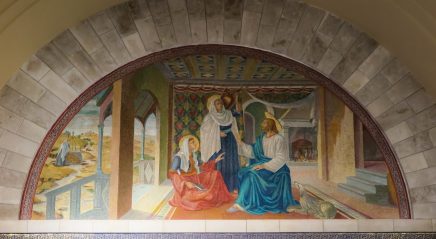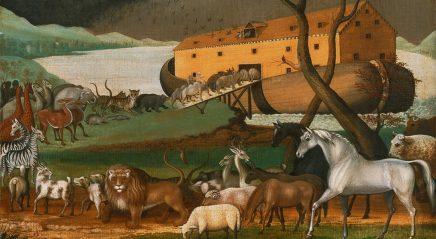Lectionary for Aug 10, 2025
Ninth Sunday after Pentecost
Genesis 15:1-6; Psalm 33:12-22;
Hebrews 11:1-3, 8-16; Luke 12:32-40
The news moves quickly, so much so that what I write is often old news by the time you read this. But I instruct the people in my biblical preaching classes on the dictum of theologian Karl Barth: We should “preach with the Bible in one hand and the newspaper in the other.” Moses’ prayers and instructions were deeply contextualized to the Israelites’ experiences in the wilderness. All the prophets, contrary to strange dispensational teaching, primarily spoke to the current events of the people among whom they lived. And Jesus, as we will see, preached and taught primarily to the experiences of the people with whom he spoke. Therefore, a preacher should endeavor to do the same—to preach to the people in the moment, acknowledging their present concerns. So here goes!
As I write this, a migrant detention center is being constructed on the waterlogged soil of the Big Cypress National Preserve. Quotas for detaining humans from somewhere else—whether or not they have committed any crimes—are being raised. (If I need to say it, this should not be a partisan issue. Every administration of any political party commits evil when it deports peaceful migrants.) The Immigration and Customs Enforcement’s budget for enforcement and deportation operations has been increased threefold, while the number of immigration judges, who could declare migrants as legal residents, was capped at 800, according to the American Immigration Council. The ELCA, among other denominations, has spoken out against this evil.
It is in this context that we read about Abraham. When he was called by God, Abraham left the place where he was living and went someplace else to receive an inheritance, not knowing where (Hebrews 11:8). He lived there as a stranger, in a land that was as foreign to him as he was to it (9). He didn’t blend in or acculturate. He was looking for a city of God, not to blend in and become a Canaanite (10). Abraham moved from Ur to Haran, from Haran to Canaan (briefly), to Egypt and then back to Canaan before flirting and fighting with the Philistine court of Abimelech. He crossed international boundaries, sometimes by God’s instructions or because he just wanted to move.
In a time when migrants are demonized, we are called to tell a better, more truthful story about Abraham and Jesus, who left their homes, lived as resident foreigners, refused to assimilate to cultures and, in the process, demonstrated God’s plan.
Christians, we are told to be like Abraham. The faithful confess that we live as strangers and exiles on earth (13). We are to look for another country, not the one from which we are born (14). After all, if one wants to only focus on a nationalistic devotion to the country in which they were born, they have an opportunity to return there if they wish to quit following God (15). But the kingdom of God is better than every country or empire on the face of the earth—whether it be the Roman Empire, the Kingdom of Israel, the United States of America.
Please hear the conclusion: God isn’t ashamed of people who give up their own country to follow God’s calling and mission (16). This means that God is ashamed of those who hold on to their nationality more tightly than their citizenship in heaven.
In the Gospel text, Jesus warns that the coming of the Human One will happen at an unexpected time, not unlike a thief breaking into a house at an unknown hour. The language of Jesus coming as a thief is important to New Testament authors. The comparison of Jesus’ Day to a thief is mentioned in Matthew 24:43; 1 Thessalonians 5:2; 2 Peter 3:10; and Revelation 3:3 and 16:15. Why the “thief” language? Jesus wants to take something from us—actually a lot of things. He wants to take our sins, our pain, our fear, our hatreds, our pride and our idolatries. Christians are simply not allowed to harm others to make ourselves feel better. That is idolatry of self.
Whenever Jesus comes back, we are to be found as faithful stewards. Such stewards do not abuse other servants. Just after the lectionary reading for this week, Jesus tells a parable of a servant who notices that the master has been gone for a long time. The servant sets himself up as a mini-king, taking the belongings of others and beating those with whom he disagrees. When the master returns, Jesus says, the one who abused others and acted like he was the boss will be hacked apart (Luke 12:42-48).
Look, being a follower of Jesus is not some pie-in-the-sky, heaven-when-I-die otherworldly mission. It is about following Jesus’ narrow way right here and now. In a time when migrants are demonized, we are called to tell a better, more truthful story about Abraham and Jesus, who left their homes, lived as resident foreigners, refused to assimilate to cultures and, in the process, demonstrated God’s plan.










